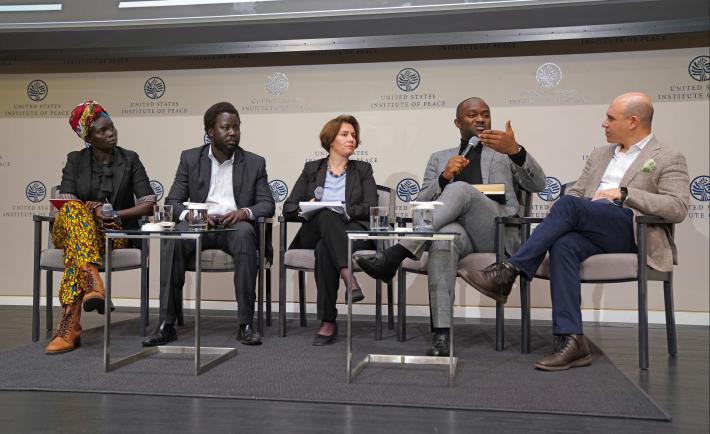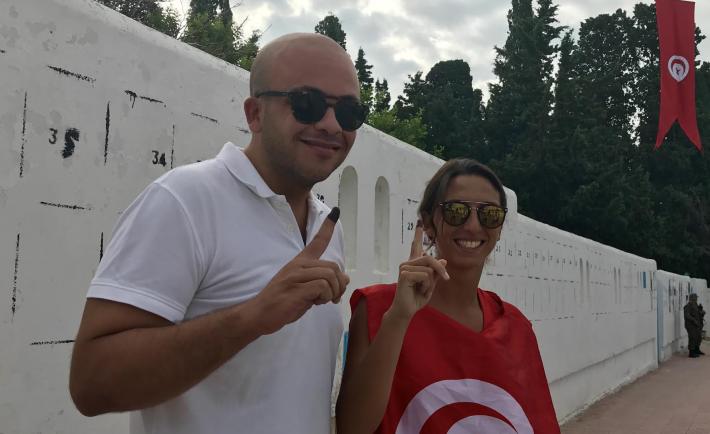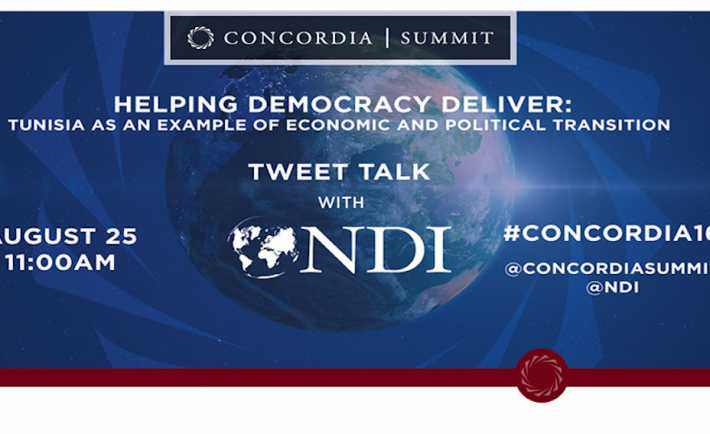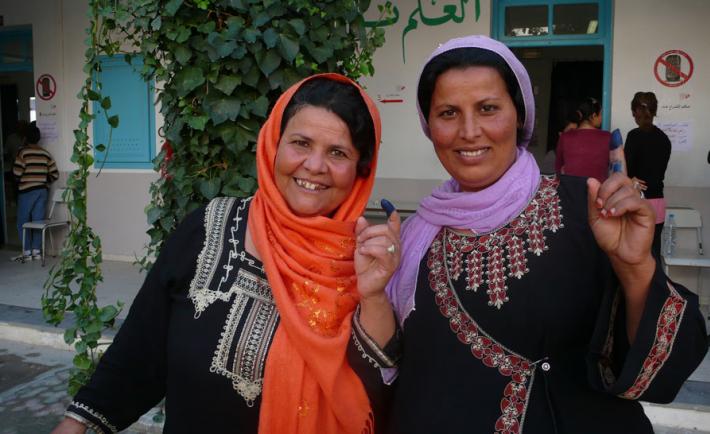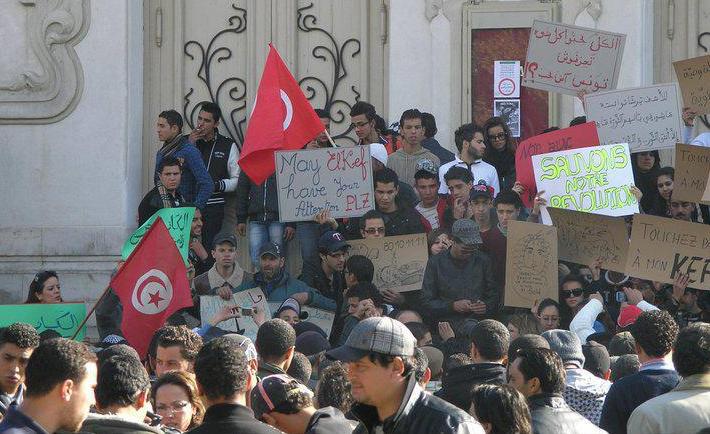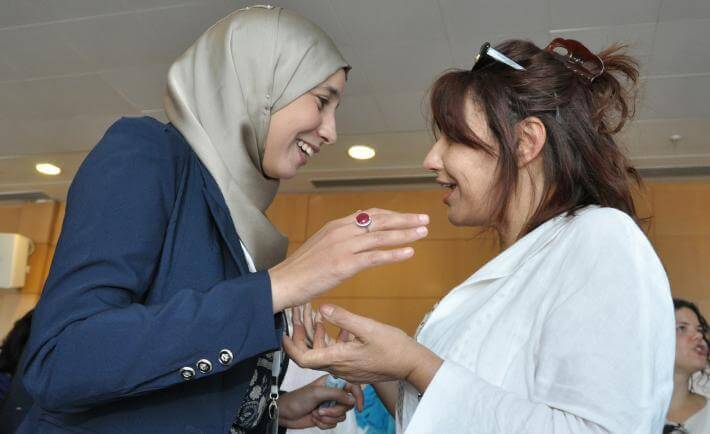In the latest episode of DemWorks, NDI’s Lauren van Metre is joined at the US Institute of Peace by global activists Emna Jeblaoui (Tunisia), Jacob Bul Bior (South Sudan), Samson Itodo (Nigeria) and Aluel Atem (South Sudan). They discuss new thinking about mobilizing good governance and the challenge violent extremism poses to democracy
How can we advance democracy and peace? (w/ Lauren van Metre)
Citizen Election Monitors Played A Key Role in Tunisia’s Presidential Elections
Representatives of six Tunisian election observation groups held a joint press conference on October 17 to deliver their assessments of the 2019 elections. From the start of voter registration in April to the conclusion of electoral appeals in November, the groups organized a coordinated effort of each phase of the electoral process.
As Tunisian citizens went to the polls to elect a new president last month, citizen observers were present in large numbers, including non-partisan observers, pollwatchers representing candidates, and international monitors like the delegation led by NDI and International Republican Institute. Since only two candidates were competing in the presidential run-off election, the total number of candidate agents declined significantly compared to the prior elections simply because there were fewer candidates contesting for positions. Misinformation began to spread that the elections were going unwatched, but non-partisan observers were out in numbers equivalent to the September 15 first-round presidential and October 6 legislative elections.
How will 2019 fit into the story of Tunisia's democratic development?
Tunisians go to the polls on Sunday for the second democratic presidential election in the country’s modern history. What will they be thinking about as they cast their ballots? Jobs? Human rights? Pollution? How will these and other priorities reshape the political landscape in the months and years to come, as the country navigates the choppy waters of economic stagnation and more stringent popular demands for elected leaders to deliver? And how do those leaders—from the president all the way down—actually realize the promises they make during election season?
The answers to these questions are relevant not just to the people of Tunisia—the birthplace of the Arab Spring—but for small-‘d’ democrats across the region who look to the country for hope and guidance. In the newest episode of the DemWorks podcast, Leo Spaans, our country director in Tunisia, and Les Campbell, NDI regional director for the Middle East and North Africa, try to provide some answers.
Who's #TweetTalking About Tunisia and Democracy?
Just weeks before the annual Concordia Summit in New York, NY on September 19th and 20th, the National Democratic Institute and Concordia partnered to host a TweetTalk as an extension of the panel, “Helping Democracy Deliver: Tunisia as an Example of Economic and Political Transition.” Like the panel, the TweetTalk aimed to explore themes like extremist activity in Libya as a threat to Tunisian progress, and whether decentralization can address regional inequalities.
Tunisia’s Democratic Transition Through the Lense of Four Prominent Advocates
This year, at its annual Democracy Award Dinner to be held on Tuesday, November 10, in Washington, D.C., NDI will honor Tunisia’s democratic transition through the lense of four Tunisians who represent its government, parliament and civil society. The Democracy Award, NDI’s highest honor, is presented annually to individuals or organizations that have demonstrated a commitment to democracy and human rights.
Tunisians Yassine Brahim, Rafik Halouani, Wafa Makhlouf and Sayida Ounissi have been, among others, at the forefront of efforts to advance the democratic transition in their country, reflecting a new generation of democratic leaders. It is leaders from civil society, political parties and government, like those honored with this year’s Democracy Award, who are turning the promise of the Tunisian revolution into real improvement in the daily lives of citizens and make democracy succeed.
The Road Forward: Tunisia Provides an Example for Democracy in the Middle East and North Africa
Nearly five years after protests against former authoritarian leader Zine El Abidine Ben Ali began in December 2010, Tunisia has adopted a modern constitution and, for the first time, democratically elected a new legislature and president. Tunisia has been lauded as an inspirational -- though not untroubled -- democracy within the Middle East and North Africa region. To ensure the current security concerns and economic difficulties do not encourage undemocratic intervention in the process, it is important that the U.S. government and international community continue to support the new Tunisian government as it makes difficult choices.
Job Opportunity: Resident Director in Tunisia
NDI is recruiting a resident country director with strong management skills and political or civic experience to oversee the implementation of NDI’s programs in Tunisia. The position will be based Tunis but will require travel throughout the country and to other locations in the Middle East and North Africa region as needed.

